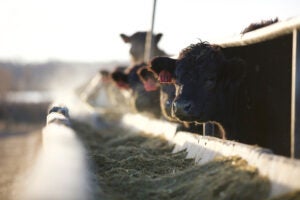The latest cattlemen’s case of fraud and schemes reads a bit like a crime novel. Wayne Butikofer, a cattleman from Clayton County, Iowa, pleaded guilty on Dec. 1 to a flurry of deceitful schemes.
The U.S. Department of Justice convicted Butikofer, 53, of one count of theft of livestock, one count of wire fraud, and one count of false bankruptcy declaration.
Operating an unregistered cattle business known as Fawn Hollow, he sold cattle he didn’t own, snagged COVID-19 relief funds by falsely claiming cattle ownership, and even nabbed $1.5 million from the Small Business Administration.
It didn’t stop there, though. Butikofer also juggled fraudulent loan payments to his attorney and cooked up a financial statement that danced around the truth during his bankruptcy. Oh, and let’s not forget his inventive H-2A worker recruitment strategy — promises of ideal housing, work conditions, and reimbursements that were all smoke and mirrors.
At no time was Butikofer or Fawn Hollow registered with the U.S. Department of Agriculture as a “dealer” under the Packers and Stockyards Act of 1921. Butikofer and another individual identified as “Individual-1” did participate in the so-called “H-2A” visa program and recruited agricultural workers from the Republic of South Africa to work at Fawn Hollow.
Between July 2020 and February 2022, Butikofer converted the proceeds of sales of cattle owned by six cattle investors to his own use. Butikofer had convinced the cattle investors to allow him to sell the cattle in his own name.
When Butikofer sold the cattle to the Wisconsin slaughterhouse, Butikofer falsely represented to the slaughterhouse that he had “good and merchantable title to” the cattle when he did not, in fact, own or otherwise have title to the cattle.
By convincing the cattle investors to permit Butikofer to sell their cattle in his own name and by fraudulently concealing the true ownership of the cattle from the slaughterhouse, Butikofer attempted to evade the requirements of the Packers and Stockyards Act and its regulations for registration, posting of a dealer bond, and prompt payment, which would have protected the cattle investors’ funds.
Defrauding the USDA of over $200,000
Between July 2020 and August 2020, Butikofer defrauded the USDA of more than $200,000 in emergency assistance funds designed to assist livestock producers during the COVID-19 pandemic. Specifically, applications were submitted in the name of Individual-1 and entitled “Coronavirus Food Assistance Program” payments.
A cattle producer qualified for CFAP payments on a per head basis based on the producer’s owned inventory of eligible beef cattle on a date selected by the producer between certain dates in calendar year 2020. It was part of Butikofer’s wire fraud scheme that the CFAP applications in Individual-1’s name falsely stated that Individual-1 owned cattle when, in truth, Individual-1 did not own any cattle.
Finally, it was part of the scheme that Butikofer would intercept or otherwise gain access to the CFAP funds once the USDA provided those funds to Individual-1 and then use those CFAP funds for his own purposes.
In February 2022, Butikofer received over $1.5 million from the Small Business Administration as part of an Economic Injury Disaster Loan application. Butikofer falsely stated to the SBA that he would use the proceeds “solely as working capital to alleviate economic injury caused by” the COVID-19 pandemic. In truth, upon receiving the $1.5 million from the SBA, Butikofer used no less than $75,000 of the EIDL funds to pay an attorney known as Attorney-1 for services rendered in connection with a Chapter 11 bankruptcy proceeding that Butikofer filed on or about February 28, 2022, in In re Michael W. Butikofer et al., Case Number 22-00096, in the United States Bankruptcy Court for the Northern District of Iowa.
In March 2022, Butikofer submitted a false and fraudulent statement of financial affairs in his bankruptcy case. In April 2022, Butikofer falsely testified under oath at a meeting of creditors and, in November 2022, repeatedly committed perjury before the bankruptcy court when asked questions about the ownership of his cattle operation.

An inventive H-2A worker recruitment strategy
From April 2023 to November 2023, while on federal pretrial release, Butikofer recruited and caused Individual-1 to recruit H-2A workers to the United States under false and fraudulent pretenses, representations, and promises.
The false and fraudulent pretenses, representations, and promises included the housing conditions provided to the employees, the location of the employees’ work, the terms and timing of reimbursement for the employees’ work and expenses, and payment for injuries sustained during the employment.
Evidence at a detention hearing held on December 1 and December 4 showed that Butikofer attempted to tamper with the grand jury and trial witnesses. In 2020, a federal district court entered a default judgment against Butikofer in favor of H2A workers from the Republic of South Africa for civil violations of the Fair Labor Standards Act and Trafficking Victims Protective Reauthorization Act in 2018.
As part of his plea agreement, Butikofer has agreed to voluntarily terminate and cease participation in foreign labor programs with respect to any program administered by the U.S. Department of Labor or U.S. Department of Homeland Security.
Sentencing before U.S. District Court Judge C.J. Williams will be set after a presentence report is prepared. Butikofer faces a possible maximum sentence of 30 years’ imprisonment, a $750,000 fine, and three years of supervised release following any imprisonment.


